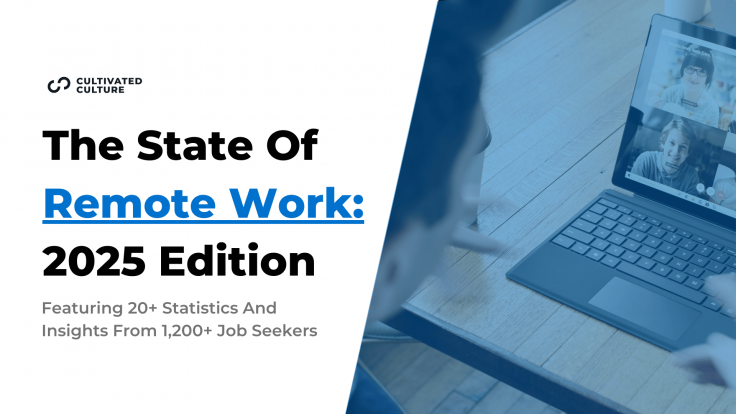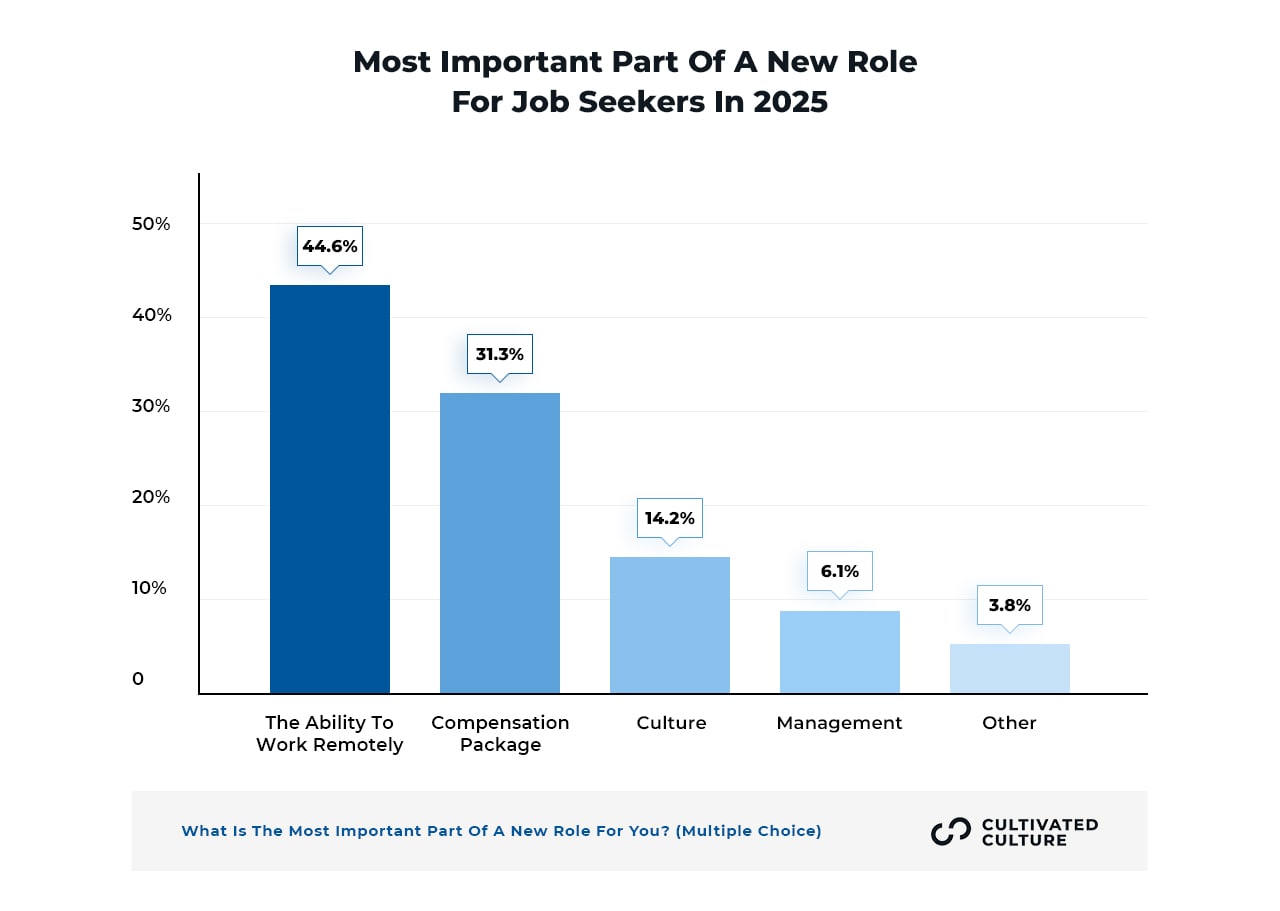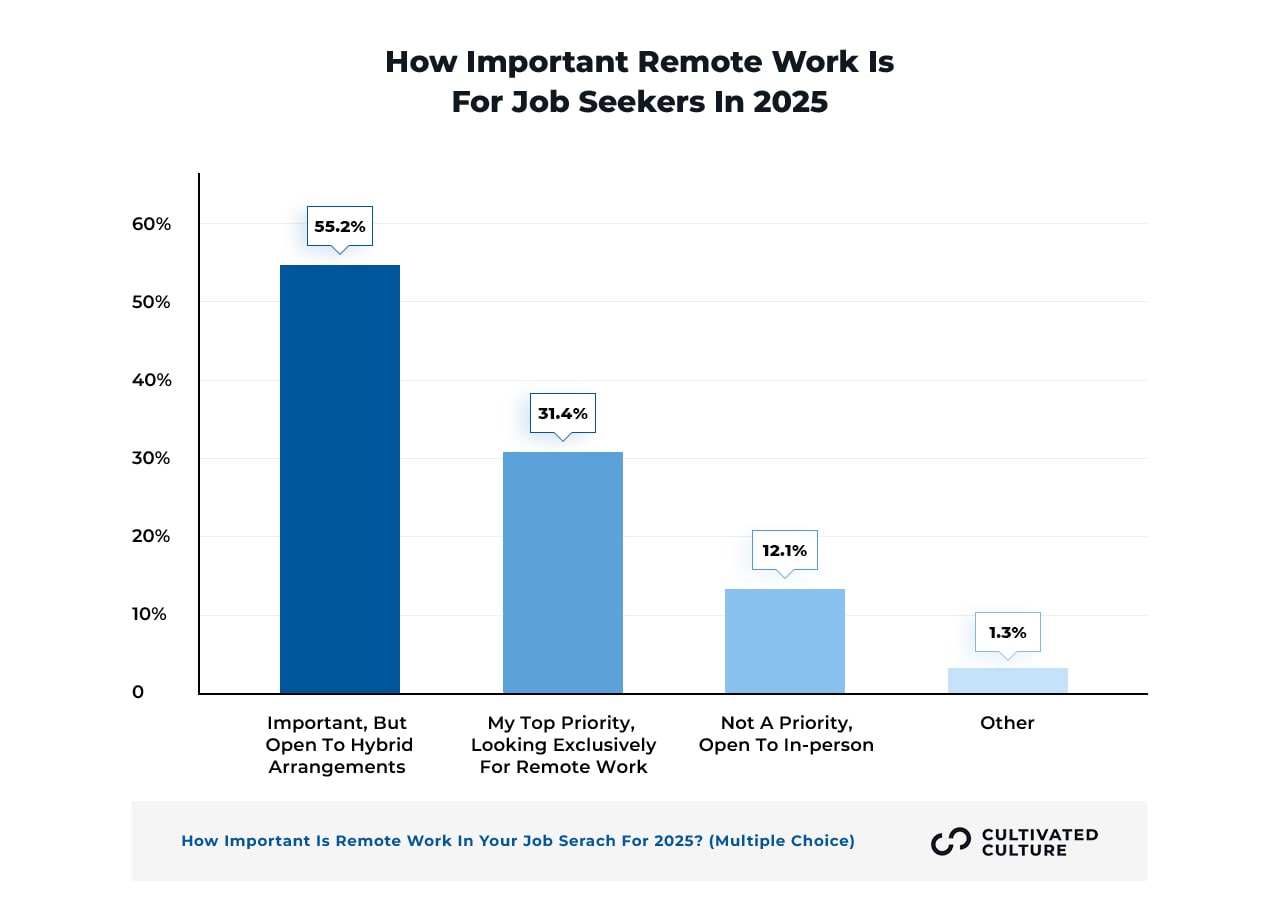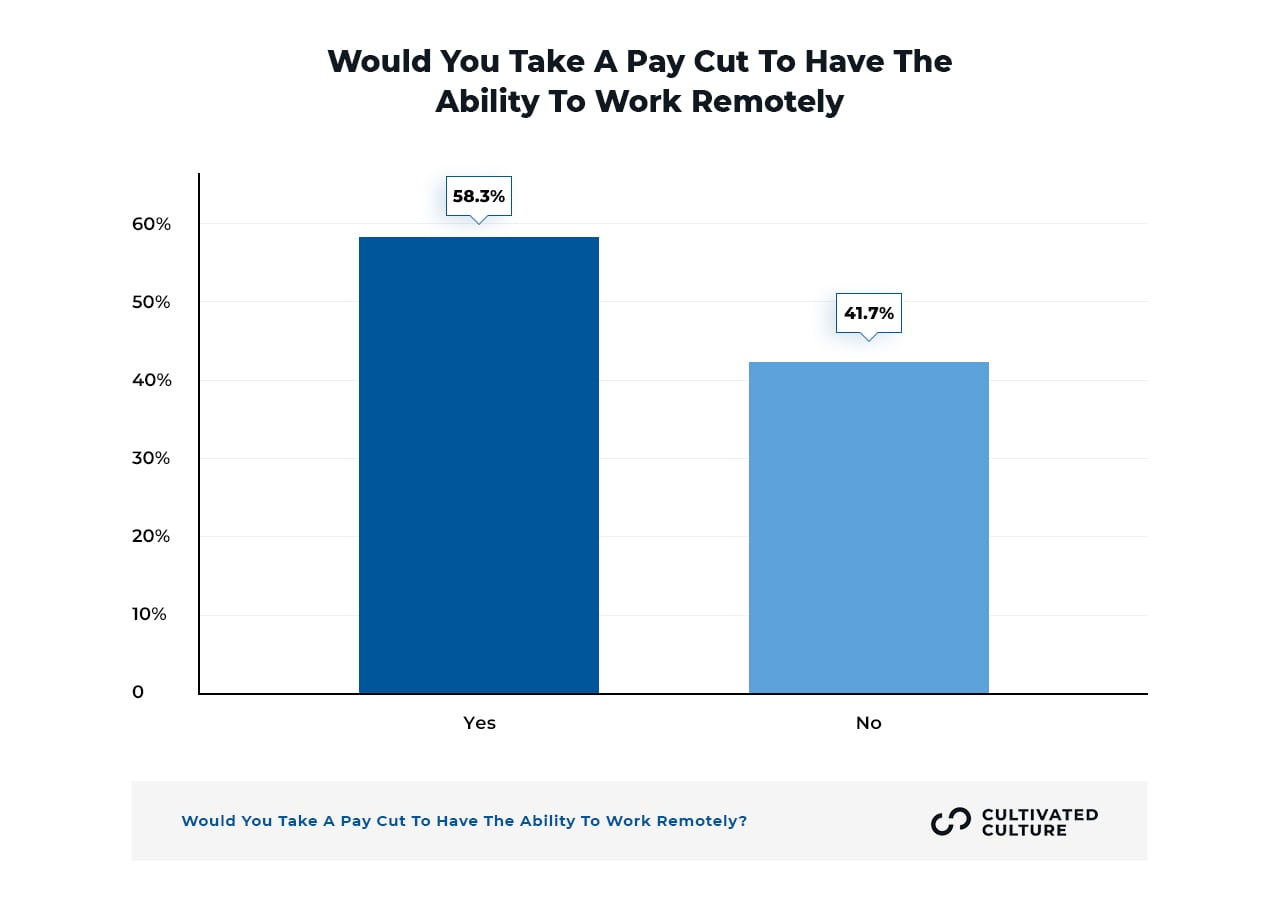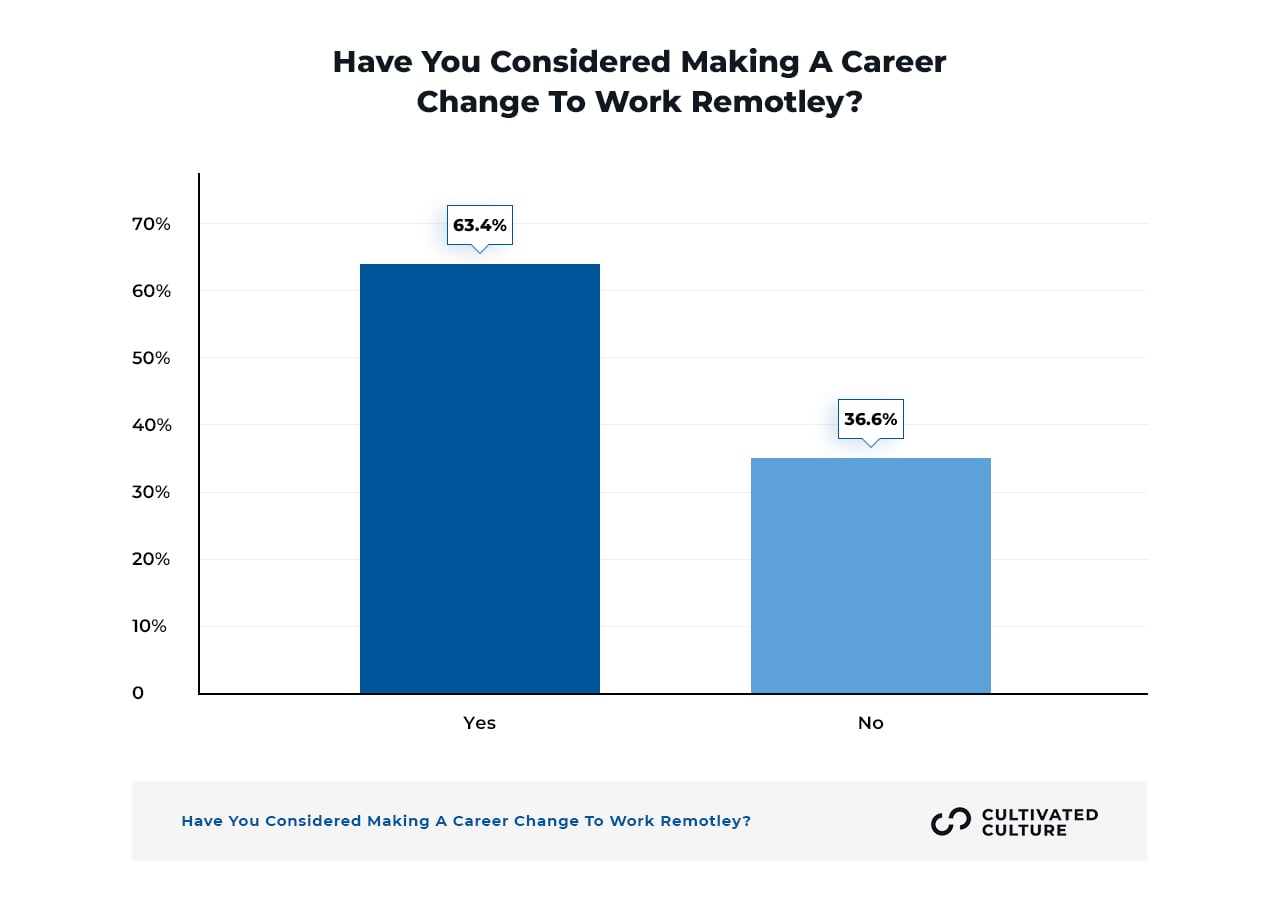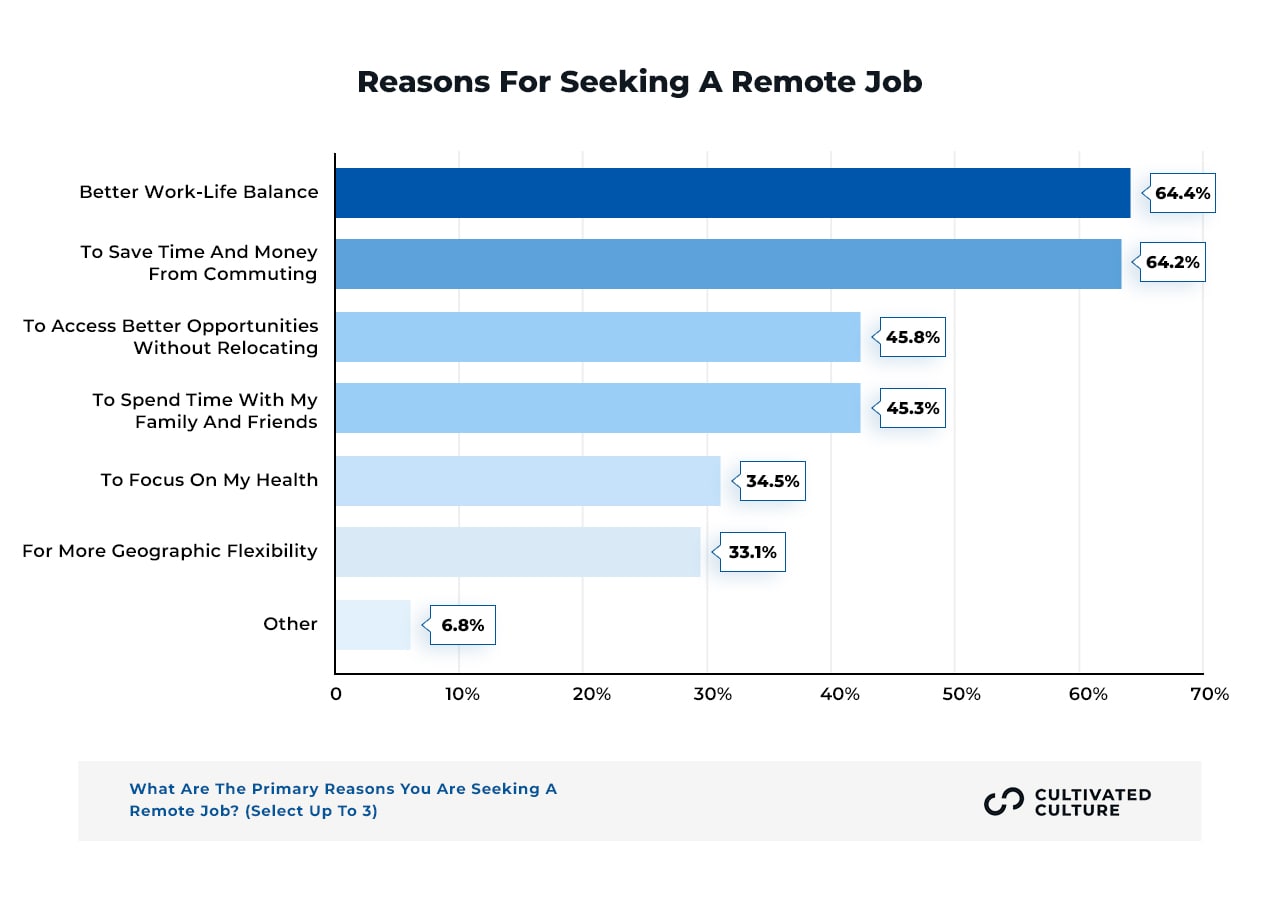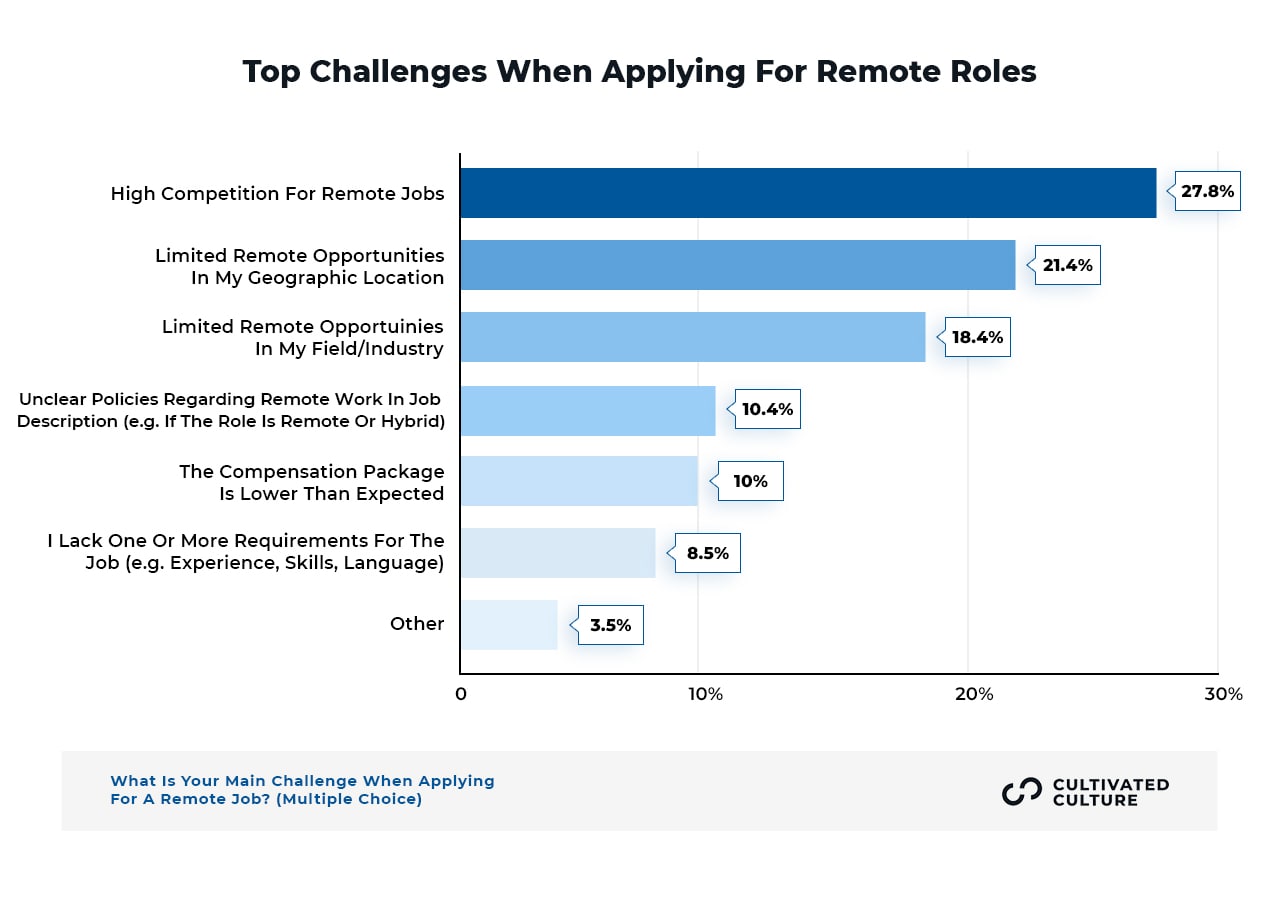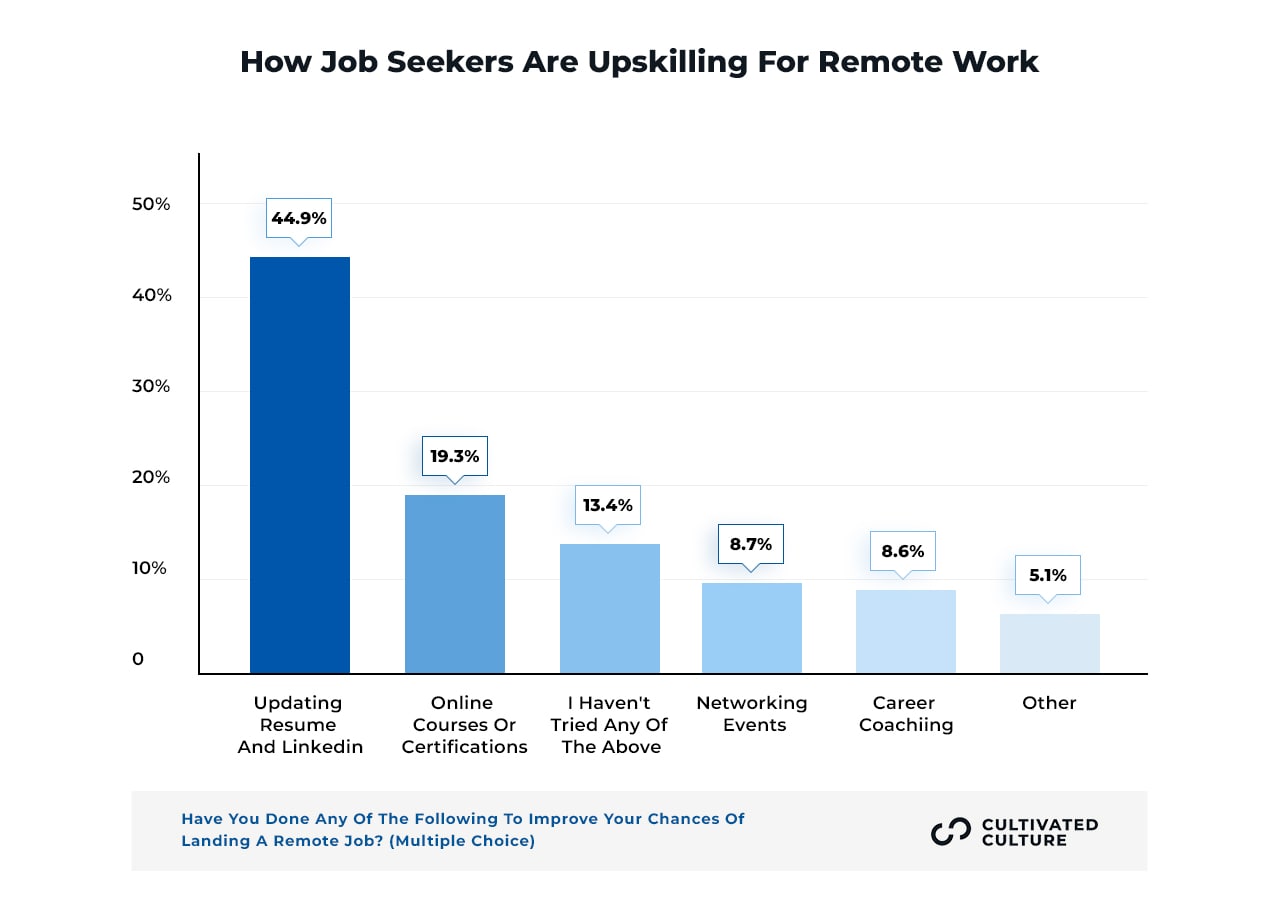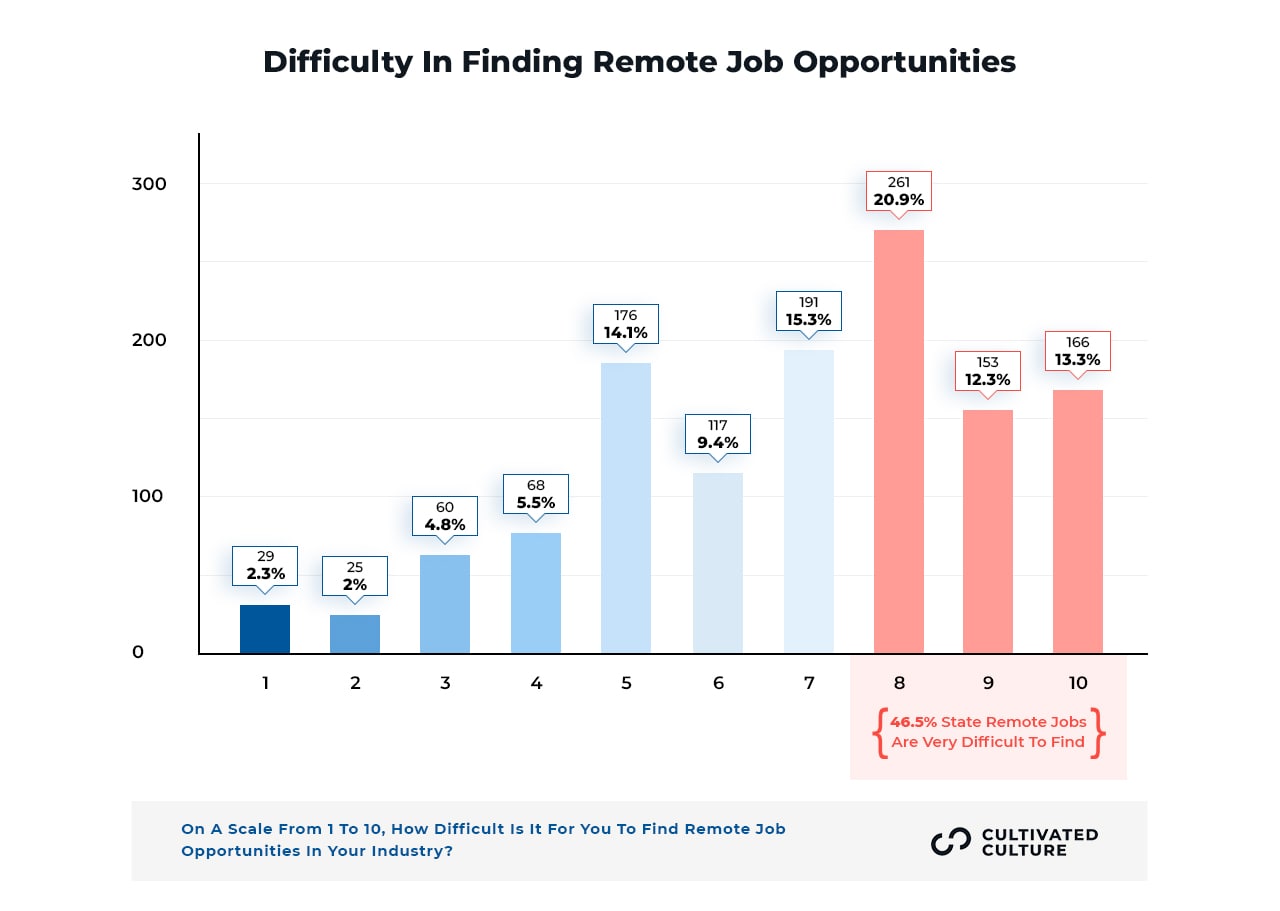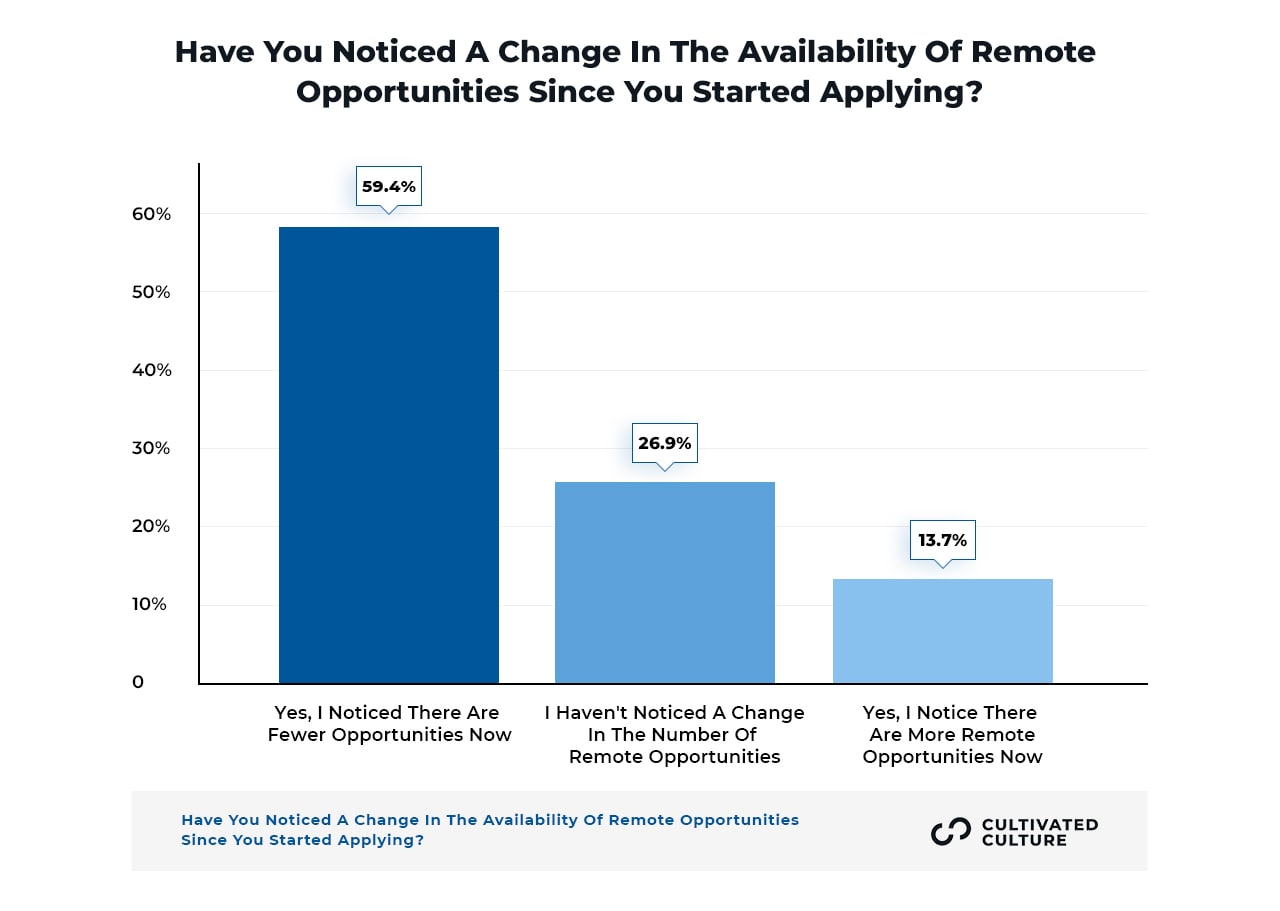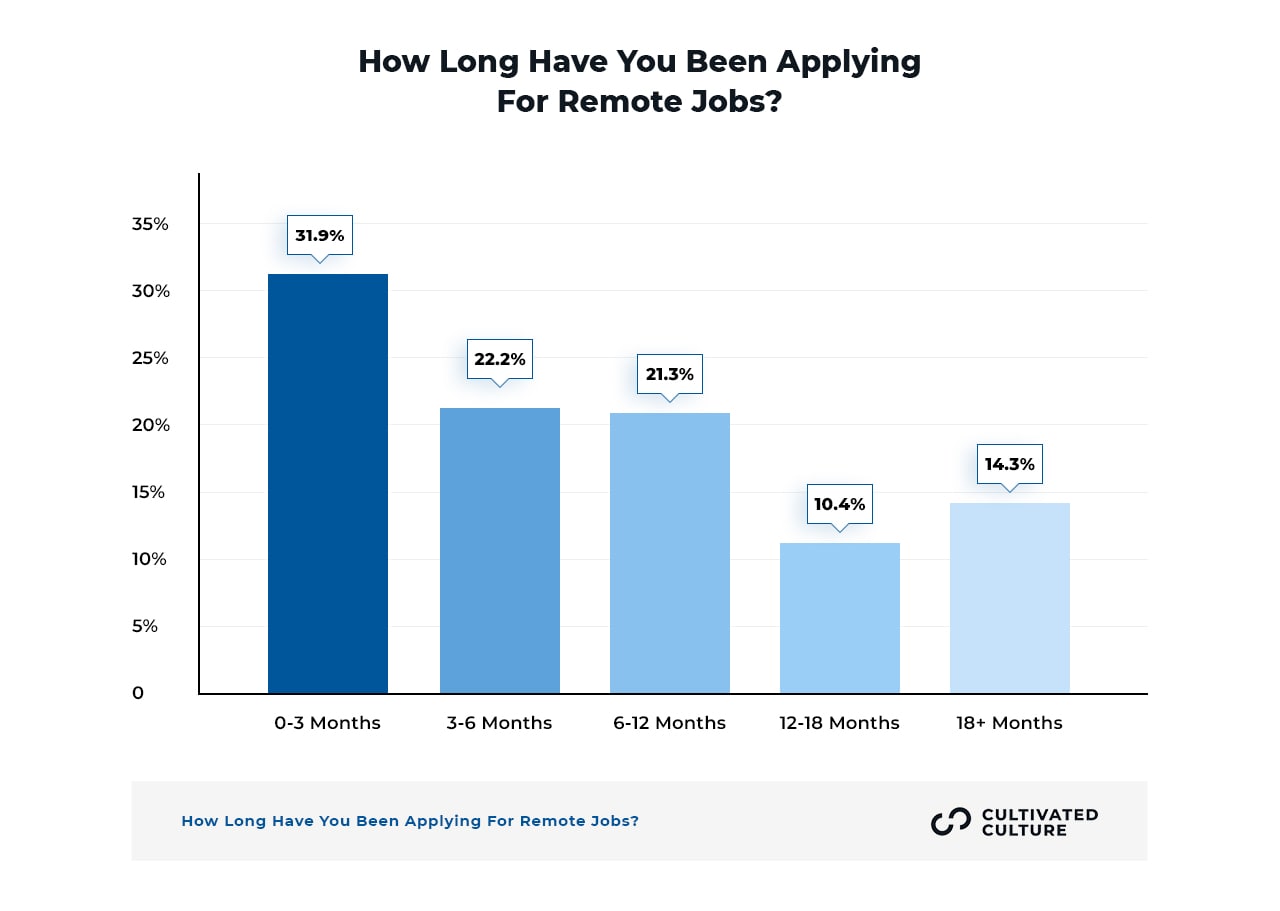Remote work is a hot topic these days.
Everywhere you look, there’s a new article about a company mandating a return to office policy.
These new policies are at odds with what we hear from job seekers every day – that they value the ability to work from home.
To understand what job seekers are seeing in their job search, we ran a survey on the state of remote jobs in 2025 and asked 1,200+ professionals what is most important when it comes to remote work in 2025.
We discovered that, while the majority of job seekers noticed fewer work-from-home opportunities currently available, 87% of them are still prioritizing remote work in their search.
And it’s not just for the work-life balance. For some, it’s essential because of responsibilities at home. One respondent said: “Remote is necessary for me (child/school). I can travel to sites monthly or quarterly to support if required. If local, I can commute two days a week within a 45 minute commute”.
Another respondent suggests it gives them more geographic flexibility: “I am tied to one city, so remote is a great option for me if available”.
For 45% of job seekers, remote work is the most important factor when considering a new role – even more important than compensation. Over half actually prefer remote work over higher pay, which suggests just how much they value this setup.
Below, we’ve listed the key findings we gathered from our survey about the state of remote jobs in 2025.
We hope this sparks a dialogue on this topic!
Remote Jobs In 2025: A Summary Of Our Key Findings
- 45% of respondents said remote work is the most important part of a new role
- 87% of job seekers are prioritizing remote work in their search, with 31% searching exclusively for work-from-home roles
- 58% said they would take a pay cut to work remotely
- 63% are willing to switch careers to work remotely
- 87% are upskilling for remote work
- 28% see high competition as the biggest challenge when applying for remote jobs
- 46% seek remote roles to access better opportunities without relocating
- 64% want remote work for better work-life balance
- 34% look for remote work to manage their health needs
- 59% noticed there are fewer remote opportunities now
Where Are The Statistics Coming From?
We ran a survey in February 2025 across our audience with 10 multiple-choice questions regarding remote work.
Our goal was to understand what job seekers are really seeing in the job market in 2025 and what is most important when it comes to remote work. We asked them:
- What they consider to be the most important part of a new role
- How difficult is it to find remote job opportunities in their industry
- How long have they been applying for remote jobs
- If they noticed any change in the availability of remote opportunities
- Their main challenge when applying for a remote job
- If they considered a career change to work remotely
- If they would take a pay cut to have the ability to work remotely
- The primary reason they are seeking a remote job
- How important is remote work in their job search in 2025
- What strategies have they adopted to improve their chances of landing a remote job
We received responses from 1,242 professionals from a diverse set of professionals from a wide variety of industries, backgrounds, and locations. Here’s what they said:
Remote Jobs Facts & Statistics In 2025
In this section, we’ll dive into the findings from our survey, The State Of Remote Jobs 2025.
The very first thing that grabbed our attention was:
45% Of Job Seekers Say Remote Work Is The Most Important Factor When Considering A New Role
We asked job seekers what was the most important part of a new role for them and, while compensation was very important for nearly one-third of respondents – representing 31.3% – it wasn’t the top pick for the number #1 priority when it comes to a new role.
The ability to work remotely wins the first spot, with 44.6% saying a work-from-home setup is the most important part of a new role.
For other respondents, it’s the combination that matters – but flexibility is a key point when it comes to decision-making. “If all else is equal, and one company offered some hybrid structure while the other was fully in office, I’m taking hybrid every time”, replied one respondent.
💡 Why It Matters: This preference for remote work demonstrates a shift in job seekers’ priorities. While the compensation package is still important, many favor roles that offer remote work over higher pay or benefits.
87% of Job Seekers Are Prioritizing Remote Work in Their Search
Not only is remote work one of the most important aspects of a new role for most job seekers, but a large portion of them aren’t even considering in-office positions.
Our survey found that 31.4% of job seekers are searching exclusively for remote jobs, while 55.2% say remote work is “important,” though they’re open to hybrid roles. This adds to 86.6% prioritizing remote work in their search. Only 12.1% of respondents said they were open to in-office positions.
💡Why It Matters: While nearly one-third of respondents are prioritizing a work-from-home arrangement, over half aren’t necessarily opposed to hybrid – but they still need the flexibility to meet their different obligations and necessities.
Over Half Of Professionals Prefer Remote Work Over Higher Pay
We asked people if they would take a pay cut to have the ability to work remotely, and we were surprised by the answers: 58.3% answered they would take the pay cut to work from home.
This closely aligns to a recent study from Harvard Business School, that found that nearly half of professionals would compromise on salary for remote work, with 40% admitting they would forgo at least 5% of their compensation to avoid the commute. A further 9% said they would take a 20% pay cut.
💡Why It Matters: It’s not that remote workers shouldn’t be paid fairly – if you are just as productive at home, you should be paid accordingly. But the data shows just how much job seekers are willing to compromise for a remote job, and how much a work-from-home setup weighs against a higher compensation package and benefits when considering an offer.
63% Of Job Seekers Are Willing To Switch Careers To Work Remotely
If trading higher pay for a work-from-home setup says a lot about how much job seekers are willing to compromise, just imagine what changing careers says about that.
We found that an impressive 63.4% of job seekers are considering a career change to work remotely.
💡Why It Matters: While building a solid career in an industry or field has been highly valued by professionals over the past decades, the data shows that, now, priorities are shifting towards a more flexible setup where time, family, and health come first – to the point that they are willing to start over in an entirely new career.
Work-Life Balance and Cost Savings Drive Remote Work – Yet 46% Seek Access To Opportunities Without Relocating
We asked professionals their primary reasons for seeking a remote job. Better work-life balance is the primary reason – representing 64.4% of job seekers – closely followed by time-saving and cost reductions with commuting – representing 64.2%.
This makes sense when you consider that in-office employees spend 26 hours commuting every month, and commuting costs professionals an average of $705 per month:
The third most important reason professionals look for remote jobs is to access better opportunities: 45.8% said they are seeking remote jobs to access better opportunities without relocating.
Think about it: many top performers can’t leave their cities, states, or even countries – and remote work is the only viable option for them to join a company where they can professionally develop.
Some job seekers even added “upskilling” and “to learn more” as their primary motives, which suggests they value continuous learning and development in their careers, but are limited by geographical constraints.
Additionally, 33.1% of respondents said they are looking for more geographic flexibility. This enables them to not only travel and experience different cultures but also to strategically relocate to areas with a lower cost of living, maximizing their earnings while minimizing expenses. For example, one respondent said they are looking for remote work “to make use of favorable currency exchanges while visiting or living in foreign countries”.
Last but certainly not least, 34.5% of professionals are looking for remote work to manage their health needs, with some respondents listing chronic illness and physical disabilities as their primary reasons.
According to a study from the National Organization on Disability (NOD), almost 19 million people with disabilities are in the U.S. workforce and they landed jobs in higher numbers in 2022. As many companies start pushing for RTO mandates, people with various health needs can find themselves boxed out from some opportunities.
Multiple respondents also mentioned caregiving responsibilities as their key drivers for seeking remote work. “I am a sole caregiver of my elderly mom. I have no family back up, and home health care is very expensive and not covered by Medicare nor private insurance”, said one respondent. Others said childcare limitations or spousal job constraints made remote work a necessity.
💡Why It Matters: Convenience isn’t the main aspect that’s driving professionals to seek remote opportunities. While work-life balance is one of the main reasons people want a work-from-home job, other aspects like time-saving, cost reductions, access to better opportunities, geographic flexibility, health issues, and caregiving needs also play into their preference.
28% Say High Competition Is The Biggest Challenge When Applying For Remote Jobs
While remote work is an important part of a new role for job seekers, many struggle to find opportunities.
The main challenge? Facing competition.
High competition is the biggest challenge for 27.8% of professionals targeting remote roles, and many also point to unrealistic job requirements as a major barrier when applying..
Another 21.4% said they struggle to find remote jobs in their geographic location, suggesting many companies will only accept candidates located in a certain area or region. This would still require professionals to relocate to access better opportunities – even if they are applying for a fully remote role.
💡Why It Matters: Although high competition is one of the main challenges for job seekers, other barriers like geographic location limit their application range. Companies could access a wider pool of talent by accepting candidates from different locations, enabling job seekers to access better opportunities.
87% Of Job Seekers Are Upskilling For Remote Work
To stay ahead of the competition, 86.6% of job seekers said they are upskilling for remote work, with nearly half targeting resume and LinkedIn optimizations: 44.9% have optimized their resume and LinkedIn profiles specifically for remote roles.
Another 19.3% have completed online courses or certifications, while 8.7% have started networking and 8.6% have hired a career coach.
💡Why It Matters: Job seekers aren’t just sitting around waiting for a remote opportunity to land on their desks. They are proactively working on strategies that will help them land a new remote role, with only 13.4% saying they haven’t tried new strategies (yet).
The Average Difficulty Of Finding Remote Jobs Opportunities Is Nearly 7/10
How hard is it to find a remote job in 2025?
We asked professionals to rate the difficulty on a scale of 1 to 10, 1 being extremely easy and 10 extremely difficult. We found that 61.8% rated the difficulty at 7 or higher – with 20.9% rating the difficulty at 8.
💡Why It Matters: With companies pushing RTO mandates and the increasing number of professionals seeking work-from-home opportunities, companies offering a fully-remote setup are flooded with applications, which increases the competition and makes it more difficult to land a remote role.
59% Of Job Seekers Noticed There Are Fewer Remote Opportunities Now
Nearly two-thirds of job seekers noticed there are fewer remote opportunities in 2025, while 26.9% said they didn’t notice any change at all. Only 13.8% said they notice there are more remote opportunities now.
What’s even more telling of the current landscape is that 24.7% of job seekers have been applying for remote jobs for over 12 months, suggesting that work-from-home opportunities are getting more competitive:
💡Why It Matters: With the decreasing number of remote opportunities, it's becoming harder for job seekers to find roles that offer the flexibility of working from home. This may lead to longer job search periods and increased competition. Companies can also suffer. If they are only accepting candidates who are willing to work in an office full time, they miss out on large pools of talent.
Our Take On The State Of Remote Jobs In 2025
We’ve gathered tons of valuable insights from surveying over 1200 professionals about remote jobs in 2025. But what conclusions can we draw from this data?
After analyzing these statistics, we came to three main conclusions:
#1 RTO Mandates Are Going To Cost Companies Talent In 2025
A good compensation package might have once been a candidate’s primary consideration when deciding between two or more job offers. But now, job seekers are willing to compromise on salary for the ability to work remotely.
Companies mandating RTO policies shouldn’t be surprised if they struggle to hire and retain talent. Remote and hybrid arrangements will have the upper hand when it comes to competing for top performers.
#2 It’s About The Flexibility, Not The Convenience
Companies mandating RTO policies can easily assume people don’t want to go back to in-office setups simply because it’s inconvenient.
However, the data shows us it’s not all about convenience. Flexibility is the main driver for these job seekers.
Over half of respondents said they would be willing to accept hybrid arrangements, meaning they are not opposed to going into the office altogether – they just don’t want to do it 5 times a week. Professionals are willing to meet halfway for an arrangement that’s suitable for both them and their companies.
#3 Remote Work Changes People's Lives
It’s no wonder that 63% of professionals are considering making a career change just so they can work remotely. While work-life balance is one of the top reasons people are looking for a remote job in 2025, this setup can also be life-changing for many. They are looking for a work-from-home job so they can:
- Save time and money from commuting: We all know how time-consuming and expensive commuting can get. The time and money employees save by not going into the office 5 days per week can be spent on other activities, such as upskilling, quality time with friends and family, or just time for themselves.
- Access better opportunities without relocating: Imagine what a game-changer it is for someone to land an amazing job opportunity they otherwise wouldn’t have access to due to their current geographic location. Remote work allows people to broaden their experiences without having to uproot their entire lives (and families) for a job.
- Manage their health needs: While some look for a remote job for a healthier routine, many also prioritize working from home because of chronic illness and physical disabilities. Remote work is an inclusive arrangement for people with different health needs.
- Manage their caregiving needs: Caregivers carry a significant load at home. Commuting and working in an office can make caregiving responsibilities untenable and prohibitively expensive if they need to be outsourced. Remote work allows people to stay closer to their loved ones and better manage caregiving responsibilities.
Companies pushing 5 day / week RTO policies usually argue they are doing it for productivity. However, a study from Stanford University found that remote workers are actually 13% more productive compared to their in-office counterparts due to fewer distractions, quieter environments, and more focused work hours.
We know that's true. Respondents from our survey, The State Of Remote Jobs 2025, backed this up by saying they are more effective working from home and function better in their own space.
“Modern office space is not conducive to getting work done. A combo of work from home and office works best for creative/political jobs“, said one respondent. Another said they are more focused at home: “It's easier to concentrate in a quiet space with no distractions or interruptions. This results in better focus, faster turnaround/completion times, and a more thoughtful approach overall“.
One study from Global Work Analytics also debunked another myth companies share about remote work: that employers can create more consistency in person.
The truth is, remote work actually decreases unplanned absences by 63% as employees can work around minor illnesses or personal appointments without needing to take full days off.
Companies that offer remote or hybrid arrangements can benefit greatly from this setup, not just the employees! In addition to increased productivity and decreased unplanned absences, employees also experience higher job satisfaction, making them more engaged with companies and more willing to commit long-term. Feels like a win-win to us!
What are your thoughts about remote jobs in 2025? Drop a comment below!

















